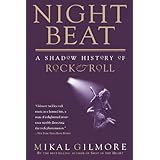
Average Reviews:

(More customer reviews)Mikal Gilmore is the finest critical voice in popular music writing today, as immediate as the great Dave Marsh or Greil Marcus, but without the former's bluster or the latter's almost serial tendencies toward stretching historical comparison. Throughout his 25 year career, Gilmore's greatest gift has been his ability to find and document the seedier underpinnings of the musician's craft, a keen night vision which has owed as much to a violent upbringing (chronicled in his excellent memoir Shot in the Heart) as to a proclivity toward music whose makers and listeners exist on the fringe of economic and political power. Night Beat is a compendium of those documents, a "greatest hits" of Gilmore's published work, some of which the author reconsidered, restructured, and rewrote specifically for this volume. This "shadow history" tells the stories of acknowledged icons (Elvis, the Beatles, Dylan), iconoclasts (David Baerwald, Sinead O'Connor, Tupac Shakur), and peripheral figures (Allen Ginsberg, Timothy Leary) in a way which casts each as a seam in the fabric of the music as a whole, bearing the implication that without any one figure, rock's patterns and product would not be the same. Cultural ties are also implicit; the voices Gilmore records often speak for others who cannot - a bond between listener and artist which sustains each through difficult circumstances. Nowhere in Night Beat is this more evident than in the extended essay "Bruce Springsteen's America," which chronicles the evolution of Springsteen's music and audience through the Reagan/Bush years. Gilmore sees the edgier motifs in Springsteen's 1980s work as a negative response to the knee-jerk patriotism of the time, and not (as it was widely felt then) an embrace of it. Such sloganeering put a glossy sheen on exclusionary economic policy and a general mean-spiritedness toward the working class and the poor, whose stories were at the heart of Springsteen's songs. The music was so misunderstood, Gilmore suggests, because it was so co-opted by the forces it was meant to rail against. Reagan's willful tactics to confuse message and meaning rendered "Born in the USA" as simply another "Morning in America" - a feel-good slogan, regardless of the bitter, brutal realities beneath it. Realities which still exist today, regardless of the balance of power. "These are pitiless times," Gilmore writes, times reflected in the chaotic street stories of Shakur and the angst-ridden anthems of Kurt Cobain. That both Shakur and Cobain are gone belies the perilous nature of shadows, the danger of the truths hiding in them. If Night Beat contains a caution, it is that our finest artists and their work offer a reflection of our own tendencies and times - their stories are our own, and good care must be taken.
Click Here to see more reviews about: Night Beat: A Shadow History of Rock and Roll
Click here for more information about Night Beat: A Shadow History of Rock and Roll

0 comments:
Post a Comment